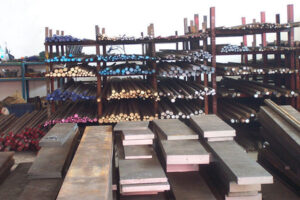A Comprehensive Guide to 1.2516 Tool Steel: Properties, Applications, and Advantages
1.2516 tool steel is a high-carbon, high-chromium steel that is commonly used in the manufacturing of cutting tools, dies, and other components that require high wear resistance and toughness. In this article, we will explore the properties, applications, and advantages of 1.2516 tool steel.
Properties of 1.2516 Tool Steel:
- Chemical Composition: The chemical composition of 1.2516 tool steel is as follows:
- Carbon (C) – 1.45-1.60%
- Chromium (Cr) – 0.60-0.90%
- Molybdenum (Mo) – 0.20-0.40%
- Nickel (Ni) – 1.50-1.80%
- Vanadium (V) – 0.05-0.15%
- Silicon (Si) – 0.10-0.40%
- Manganese (Mn) – 0.10-0.50%
- Phosphorus (P) – 0.030% max
- Sulfur (S) – 0.030% max
- Hardness: The hardness of 1.2516 tool steel ranges from 56-60 HRC (Rockwell hardness).
- Wear Resistance: 1.2516 tool steel exhibits excellent wear resistance due to the high carbon content in its chemical composition. It can withstand high temperatures and high-speed applications without losing its hardness and wear resistance.
- Toughness: 1.2516 tool steel exhibits good toughness, which makes it ideal for applications that require high impact resistance.
Applications of 1.2516 Tool Steel:
- Cutting Tools: 1.2516 tool steel is widely used in the manufacturing of cutting tools such as knives, saw blades, and other cutting tools that require high wear resistance and toughness. It is suitable for applications that involve cutting hard materials such as wood, plastics, and metals.
- Dies: 1.2516 tool steel is also used in the manufacturing of dies for the production of components that require high precision and durability. It is ideal for the production of stamping dies, extrusion dies, and forging dies.
- Other Tools: 1.2516 tool steel is used in the manufacturing of various other tools that require high wear resistance and toughness. These include shear blades, punches, and other industrial components.
Advantages of 1.2516 Tool Steel:
- High Wear Resistance: 1.2516 tool steel exhibits high wear resistance due to the presence of high carbon content in its chemical composition. This makes it ideal for applications that require high durability and long service life.
- Good Toughness: 1.2516 tool steel exhibits good toughness, which makes it ideal for applications that require high impact resistance. This also helps to prevent the steel from cracking or breaking under high stress or pressure.
- Good Dimensional Stability: 1.2516 tool steel exhibits good dimensional stability, which means it maintains its shape and size even under high stress or pressure. This makes it an ideal material for applications that require high precision and accuracy.
- Easy to Machine: 1.2516 tool steel is easy to machine and can be shaped into various forms without losing its properties. This makes it an ideal material for manufacturers and engineers looking for a material that is easy to work with and can be shaped into complex forms.
Conclusion:
1.2516 tool steel is a reliable and versatile material that is widely used in various industrial applications. Its high wear resistance, good toughness, good dimensional stability, and easy machinability make it an ideal material for manufacturers and engineers looking for a reliable and durable material that can withstand high-stress applications. By understanding its properties, applications, and advantages, you can make informed decisions when selecting materials for your projects and ensure optimal performance and longevity of your components and tools.
When working with 1.2516 tool steel, it is important to ensure proper heat treatment to achieve the desired hardness and properties. The steel should be preheated before hardening and then tempered for use in applications that require high wear resistance. Proper heat treatment ensures that the steel maintains its properties and performance over time.
In summary, 1.2516 tool steel is a reliable and versatile material that is widely used in various industrial applications. Its high wear resistance, good toughness, good dimensional stability, and easy machinability make it an ideal material for applications that require high precision and durability. By understanding its properties, applications, and advantages, you can select the right material for your projects and ensure optimal performance and longevity of your components and tools.



